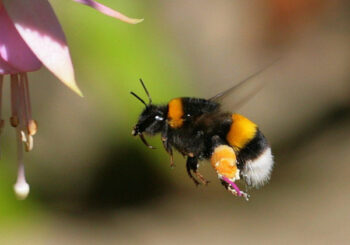By John Patterson
Staff Writer for Wake Up World
In a new study spanning 106 sites across eight European countries, researchers have uncovered alarming evidence that pesticides, commonly used in farmland, pose a significant threat to bumblebees. Published in the esteemed journal Nature, the study emphasizes the urgent need for more comprehensive measures to protect these vital wild pollinators.
[pro_ad_display_adzone id=”110028″]
The Shocking Reality: Pesticides Persist Despite Regulations
Despite tightened pesticide regulations, the study reveals that the approved pesticides used in European agricultural landscapes still have detrimental effects on non-target organisms. Bumblebee colonies exposed to these pesticides experienced substantial reductions in total colony production, maximum colony weight, and the number of new queens. This grim reality underscores the inadequacy of current pesticide regulations in safeguarding essential pollinators.
When you step outside the laboratory, a challenge of ecotoxicology is to capture the effect of real-world practices at organism-relevant scales.
— Dr. Charlie Nicholson, Co-lead Author and Postdoc at Lund University
Real-world Impact: Pesticides Hit Harder in Less Habitat
The study emphasizes that the negative impact of pesticides intensifies in landscapes with less habitat. Dr. Jessica Knapp, co-lead author, notes that healthier colonies exposed to fewer pesticides serve as a baseline, revealing that 60% of bumblebee colonies would fail proposed pollinator protection goals. This challenges the prevailing assumption that individually approved pesticides are environmentally benign when used collectively.
Our findings show that the current assumption of pesticide regulation fails to safeguard bees and potentially other pollinators that support agricultural production and wild plant pollination.
— Dr. Jessica Knapp, Co-lead Author, Trinity College Dublin
PoshBee Project: A Collaborative Effort for Bee Health
The study is a pivotal output of PoshBee, a pan-European project dedicated to monitoring and improving bee health. Professor Mark Brown, PoshBee coordinator at Royal Holloway University of London, highlights the significance of international collaboration, stating, “Bumblebees, and other animals, do not recognize international borders, and to protect them, we need to take a similarly international approach.”
The scale of this work provides a step-change in our understanding of the impact of agrochemicals on pollinator health.
— Prof. Mark Brown, PoshBee Coordinator, Royal Holloway University of London
[pro_ad_display_adzone id=”110030″]
Urgent Call for Sustainable Solutions
The study’s findings underscore the necessity for sustainability goals to reduce pesticide use and risk, aligning with the goals of the Convention on Biological Diversity’s COP 15 meeting and the European Farm to Fork strategy. Dr. Maj Rundlöf, the senior author, emphasizes the need for landscape-based environmental risk assessment and post-approval monitoring to better understand the wider impact of pesticide use on the entire pollinator community.
Our work supports the development of landscape-based environmental risk assessment and post-approval monitoring of bees’ pesticide exposure and effects.
— Dr. Maj Rundlöf, Senior Author and Researcher, Lund University
Ireland Takes the Lead in Pesticide Reduction
The study underscores the importance of initiatives like the All Ireland Pollinator Plan, as Ireland leads the way in reducing pesticide use and risk by 2050. Recognizing that pesticides do more harm in landscapes with less habitat, boosting pollinator habitat across Ireland becomes crucial to mitigating the pesticides our bees are exposed to.
In conclusion, this research serves as a clarion call for immediate action to protect bumblebees and other essential pollinators. The collaboration of researchers, beekeepers, farmers, and international efforts is vital to reversing the tide and ensuring a safer environment for our precious pollinators.
Reference:
Pesticide use negatively affects bumble bees across European landscapes. Nature, 2023; DOI: 10.1038/s41586-023-06773-3
About the author:
John Patterson is an avid writer and researcher who delves into the latest scientific research. With an insatiable curiosity, he translates complex concepts into accessible narratives, allowing readers to embark on a journey of discovery. Through his work, John bridges the gap between experts and the public, igniting curiosity and inspiring meaningful conversations about scientific breakthroughs.
[pro_ad_display_adzone id=”110027″]







